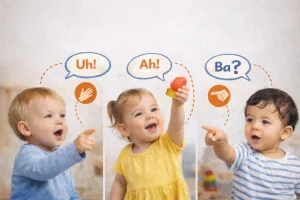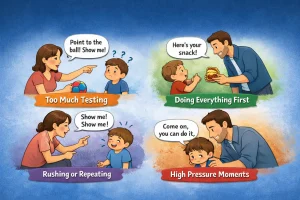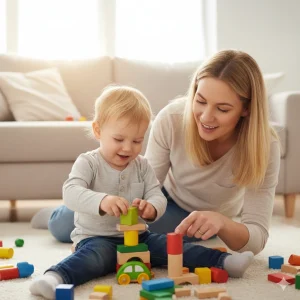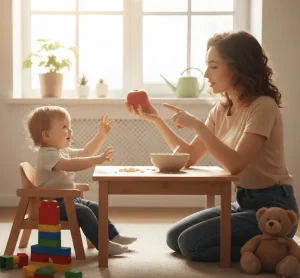18-Month-Old Not Talking? Speech Milestones & Delay Signs
By Rajini D
Last Updated: July 29, 2025
Is your 18-month-old not talking as much as other kids? It’s a common worry for many parents. While some toddlers start speaking early, others take their time. But how do you know what’s normal and when to take action? In this guide, we’ll walk you through the key 18-month-old speech milestones, signs of speech delay, and simple tips to help your toddler talk more at home. Whether you’re just curious or feeling concerned, you’re not alone — and early support can make a big difference.
Free Speech Help for Kids
Concerned about speech delays? Book a free consultation with our expert speech therapist and get guidance tailored to your child’s needs.
What Are the Normal Speech Milestones for an 18-Month-Old?
How many words should an 18-month-old say?
By 18 months, most toddlers can say around 10 to 20 words, though some may say more. These words may not sound perfect — and that’s completely fine. What matters most is that your child is trying to communicate and using words meaningfully, like saying “mama” when they want you or “ball” while pointing to one.
Every child develops at their own pace. Some toddlers focus more on walking first, and then start talking. But in general, if your 18-month-old is using at least a few clear words and trying to repeat others, they’re likely on the right track in their speech development.
If your toddler isn’t saying any words at all or only babbles without trying to use real words, it might be worth keeping an eye on — especially if they also don’t point, make eye contact, or follow simple directions. (In such cases, early support can make a big difference.)
What types of words do toddlers usually say first?
At this stage, toddlers tend to use simple, everyday words that are easy to say and hear often. This usually includes:
- Names of family members (like “mama” or “dada”)
- Favorite objects (“ball,” “car,” “milk”)
- Daily needs (“more,” “bye,” “no,” “up”)
- Animal sounds (“woof,” “moo,” “meow”)
What’s interesting is that some of these words may be slightly unclear but still consistent — like saying “ba” for “ball” every time. That still counts as a word! As long as your toddler uses the word in context and you know what they mean, it’s a positive sign of growing language skills.
What is the difference between Receptive and Expressive language?
Understanding how children communicate starts with knowing two key parts of language:
- Receptive language is what your child understands. For example, when you say, “Give me the toy,” and your child hands it to you — that’s receptive language.
- Expressive language is what your child says or expresses using words, gestures, or sounds.
At 18 months, children usually understand a lot more than they can say. This means they may follow simple instructions or look at familiar objects when named — even if they don’t say many words themselves. This is normal and part of early toddler speech development.
Also read: Receptive-Expressive Language Disorder: Signs and Help
Is It Normal If My 18-Month-Old Is Not Talking Much?
Signs of typical vs. delayed speech in toddlers
It’s natural to wonder if your child is on track, especially if they’re not saying as many words as other toddlers you know. At 18 months, some children are using 10–20 words confidently, while others may only say a few. So what’s normal?
Here’s a quick way to look at it:
Typical speech signs at 18 months:
- Says at least 5–10 clear words
- Tries to repeat what you say
- Points to things they want
- Follows simple directions (“come here,” “give me the ball”)
- Shows interest in songs, books, and people talking
Possible signs of speech delay:
- Doesn’t say any clear words
- Rarely babbles or makes sounds
- Doesn’t point or gesture to communicate
- Doesn’t follow simple instructions
- Seems uninterested in people or sounds
If your child is showing more signs from the second list, it could be a sign of speech delay in toddlers — and it’s worth exploring further.
What if my 18-month-old understands but doesn’t talk?
This is actually quite common. Many toddlers seem quiet but understand a lot more than they can say. For example, your child may point to their shoes when you say “Let’s go outside” or follow you to the kitchen when you say “Snack time!” — this shows strong receptive language.
If your toddler:
- Responds to their name
- Follows directions
- Points or gestures
- Makes eye contact
…but doesn’t say much, it could just be a delay in expressive language, not necessarily a cause for worry.
Still, this is a good time to gently encourage speech at home and keep observing. If the gap between understanding and speaking seems to be growing, it may be time to speak with a professional.
Should I worry if my toddler says very few words?
If your 18-month-old is saying fewer than 5 clear words, or not trying to imitate sounds or gestures, it’s okay to feel concerned. Early speech skills are linked to how well children will express themselves later — and the earlier support begins, the better.
But worrying alone doesn’t help. Instead, take action:
- Try simple speech games and routines
- Talk and name things often during daily tasks
- Sing repetitive songs and read simple books
- Track small improvements each week
Reasons Why Your 18-Month-Old May Not Be Talking Yet
Common causes of speech delay in toddlers
If you’ve been wondering, “Why is my 18-month-old not talking yet?” — you’re not alone. Many parents ask this question, and the answer isn’t always simple. Some toddlers are just late bloomers. But in some cases, there may be specific reasons behind the delay.
Here are a few common causes of speech delay in toddlers:
- Hearing problems: Even mild hearing loss (like from frequent ear infections) can affect how your child picks up sounds and words.
- Lack of interaction: Children need lots of talk time — stories, songs, play — to build their language skills.
- Bilingual environment: If your toddler is exposed to two or more languages, they may take a little longer to start speaking, but this is usually not a concern.
- Oral-motor challenges: Some kids may have trouble using their lips, tongue, or jaw properly to form words.
- Developmental delays: In some cases, a speech delay may be part of a larger developmental issue.
Is it a speech delay or something more?
It’s important to look at the bigger picture. Sometimes a toddler not talking at 18 months is simply a case of slower development. But other times, the delay could be part of a broader concern.
Ask yourself:
- Does my child try to communicate in other ways (pointing, gestures, sounds)?
- Does my child show interest in people and play?
- Can they follow simple instructions?
When to consider autism or hearing issues
Sometimes, speech delays are linked to conditions like autism spectrum disorder (ASD) or hearing loss. That doesn’t mean every quiet toddler has a serious issue, but it’s worth watching for a few signs.
Possible signs of autism in an 18-month-old include:
- Limited eye contact
- Doesn’t respond to their name
- Doesn’t point to show interest
- Prefers to play alone
- Repeats the same actions or sounds over and over
Signs of hearing problems include:
- Not reacting to sounds or voices
- Turning up the volume too high
- Not babbling or responding to speech
How to Encourage Your 18-Month-Old to Talk More at Home
Easy daily speech tips for parents
Helping your 18-month-old talk more doesn’t have to be complicated. The best way to support your toddler’s language development is through small, simple moments that happen every day.
Here are a few easy, effective tips:
- Talk more, even if they don’t talk back: Describe what you’re doing — “I’m cutting the apple,” or “Let’s put on your shoes.”
- Pause and wait: After asking a question, give your child a moment to respond. This teaches them that conversation goes both ways.
- Repeat and expand: If your child says “car,” you can say, “Yes! A red car.”
- Celebrate their words: Every word, sound, or attempt counts. Smile, clap, and show excitement.
These small steps go a long way in building your toddler’s confidence to use words more often.
Talking during routines and playtime
One of the best times to help your toddler talk more is during everyday routines. You don’t need fancy tools — just your voice and attention.
Try this:
- Bath time: “Let’s wash your arms. Splash splash!”
- Mealtime: “Here’s your spoon. Mmm, banana!”
- Dressing up: “Shirt on! One, two, done!”
During playtime, follow your child’s lead. If they’re stacking blocks, talk about it: “Big block. Now a small block. Crash!” Use simple words with excitement to make learning fun.
The more your child hears language in context, the easier it is for them to understand and try speaking.
Best books, songs, and toys to support speech
Toddlers love repetition — and that’s perfect for language growth. Choose books and songs that repeat phrases and encourage interaction.
Great choices include:
- Books with simple pictures and short, repeated lines (like Brown Bear, Brown Bear or Dear Zoo)
- Songs with motions and actions, like “Wheels on the Bus,” “If You’re Happy and You Know It,” or “Twinkle Twinkle”
- Toys that encourage pretend play or sound imitation — toy animals, food sets, or musical toys
When Should I Worry About My Toddler’s Speech Development?
Red flags in toddler language development
It’s completely normal for toddlers to develop at their own pace — but knowing what red flags to look for can help you decide when it’s time to get extra support.
You might want to explore help if your 18-month-old:
- Says fewer than 5 clear words
- Doesn’t babble or try to copy your sounds
- Doesn’t point or gesture to show what they want
- Struggles to follow simple instructions
- Doesn’t respond to their name
- Seems more focused on objects than people
When to contact a speech-language therapist
If you’ve noticed one or more of the red flags above, or if you simply feel unsure about your child’s speech development, it’s a good idea to speak with a speech-language therapist.
You don’t need a doctor’s referral to reach out. A therapist can:
- Check your toddler’s speech and language skills
- Help you understand what’s typical and what’s not
- Offer simple home strategies or suggest early sessions if needed
Early therapy doesn’t mean your child will need long-term help. In many cases, just a few sessions — along with home activities — can make a big difference.
Why early action matters
Many parents hear the phrase “wait and see” — but when it comes to speech delays, early action is key. Research shows that toddlers who get help early are more likely to catch up and succeed in school and social settings.
Here’s why it helps:
- Speech is the foundation for learning, behavior, and confidence
- Delays can affect reading, writing, and making friends later
- The earlier the brain gets support, the easier it is to build skills
Conclusion
Every child grows at their own pace, and that’s okay. Some toddlers start talking early, while others need a little more time. What’s important is watching their speech milestones and gently supporting their growth. If your 18-month-old isn’t talking much, don’t panic — but don’t wait too long either. Early help can make a big difference. Talk, read, sing, and play every day. And if you’re unsure, we’re here for you.
Explore speech therapy for toddlers at Wellness Hub — get expert support, home tips, and tools to help your child start talking with confidence.
Frequently Asked Questions:
1. How many words should my 18-month-old say?
Most 18-month-olds say between 10 to 20 simple words. Some may say more, and some a little less. It’s normal if they’re still learning.
2. Is it normal for my 18-month-old not to talk yet?
It can be normal for some toddlers to start late, but if your child isn’t saying at least a few words by 18 months, it’s good to keep an eye on it or talk to a professional.
3. What are signs of speech delay in toddlers?
Some signs include not saying any words, not pointing or gesturing, not responding to their name, and not trying to copy sounds.
4. My toddler understands everything but doesn’t talk — should I worry?
If your toddler understands words but doesn’t say them, it might just be an expressive delay. Still, it’s helpful to get advice early.
5. When should I worry about my toddler’s speech development?
If your child has fewer than 5 words, doesn’t try to talk or gesture, or isn’t responding to voices, it’s a good idea to speak with a speech therapist.
6. How can I help my 18-month-old talk more?
Talk often, name things, read simple books, sing songs, and give your child time to respond. Keep language fun and part of daily routines.
7. Do boys talk later than girls?
Yes, boys often start talking a little later than girls, but the difference is usually small. Look more at overall progress than gender alone.
8. Can too much screen time affect my toddler’s speech?
Yes. Too much screen time can limit real conversations. Toddlers learn best by talking and playing with people, not screens.
9. Should I wait or start speech therapy early?
It’s best not to wait. Early support helps children catch up faster. Starting therapy doesn’t mean something is wrong — it just gives your child a boost.
10. Where can I find toddler speech therapy near me?
You can explore online speech therapy for toddlers at Wellness Hub. We offer expert help, home-based tools, and free consultations to support your child’s speech journey.
About the Author:
Rajini Darugupally
M.Sc., Speech-Language Pathologist (9+ years of experience)
Rajini is a passionate and dedicated Speech-Language Pathologist with over 9+ years of experience, specializing in both developmental speech and language disorders in children and rehabilitation in adults. Driven by a desire to empower each individual to find their voice, Rajini brings a wealth of experience and a warm, genuine approach to therapy. Currently, at Wellness Hub, she thrives in a team environment that values innovation, compassion, and achieving results for their clients.
Book your Free Consultation Today
Parent/Caregiver Info:
Client’s Details:
* Error Message









